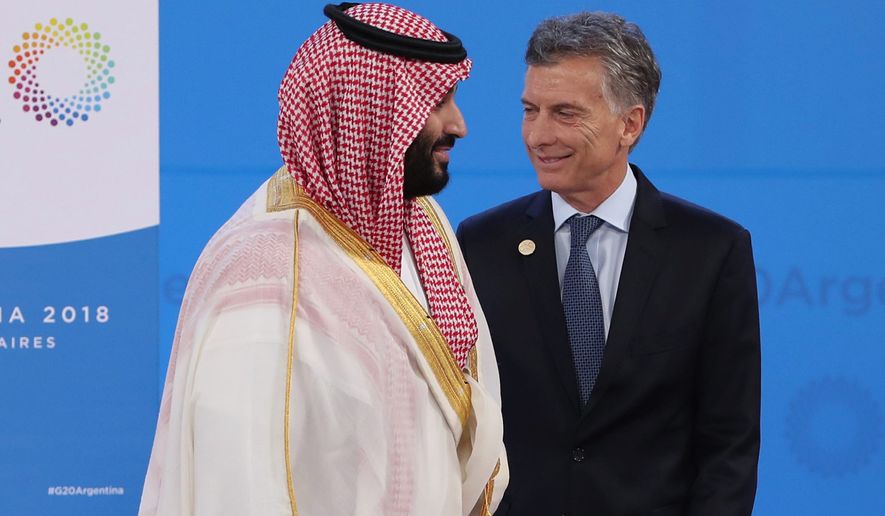BUENOS AIRES, Argentina — This weekend’s Group of 20 summit may have delivered little of substance on trade, climate change or immigration. But at least for embattled Saudi Crown Prince Mohammed bin Salman, the meeting of the world’s most powerful leaders was a smashing success.
The crown prince flew into the Argentine capital on Wednesday under a heavy cloud — in the midst of a global furor over the brutal killing of one of his most prominent critics, U.S.-based Saudi journalist Jamal Khashoggi, at the kingdom’s Istanbul consulate Oct. 2 — predictions were rife that he would be a pariah among his peers.
To make matters worse, the New York-based Human Rights Watch had gotten an Argentine judge to investigate the de facto ruler of the oil-rich country over his alleged involvement in the Khashoggi murder — a hypothesis backed by a CIA report — and what the group called “apparent war crimes” in Yemen.
But that criminal complaint quickly fizzled out after Argentine authorities hastened to underline the prince’s “special immunity,” while G20 leaders from Russia’s Vladimir Putin to France’s Emmanuel Macron made it clear they were still willing to do business — literally and figuratively — with crown prince Mohammed each time he ventured outside Riyadh’s embassy in the Argentine capital.
The French president was captured on video distributing what sounded like fatherly counsel and tough love, telling the 33-year-old crown prince that “I am worried” and “You never listen to me.” Perhaps conscious of the possible public reaction, though, Mr. Macron then continued his conversation at an angle less friendly to the camera.
Other leaders, including Argentine President and summit host Mauricio Macri, made even less effort to conceal their priorities when it comes to the Saudis.
“He outlined all the investment opportunities his country has in Argentina,” Mr. Macri said. “And we, of course, invited his country to invest in our country, in order to create jobs for Argentines, which is my highest concern.”
The Argentine president let it be understood that he discussed the Khashoggi killing with Turkish President Recep Tayyip Erdogan, a persistent crown prince Mohammed critic, but not with the prince himself. “Pertinent institutions,” Mr. Macri added, should discover the “truth.”
British Prime Minister Theresa May, meanwhile, went so far as to explicitly request a meeting with crown prince Mohammed on the sidelines of the summit, though officials later insisted that their Friday one-on-one was solely about Yemen and Mr. Khashoggi — and not trade or new commercial deals between their nations.
Ms. May’s conservative government had come under mounting pressure after revelations that British arms sales to Riyadh had increased by two-thirds, or more than $570 million in 2017, even as Riyadh was receiving harsh criticism for the war it is spearheading in neighboring Yemen against Iranian-backed Houthi rebels.
“What I said to the crown prince [Friday] was the importance of a full, credible, transparent investigation that identifies those who were involved,” Ms. May said, “and the importance of insuring that those who were involved are held to account.”
The leaders’ cautious critiques — President Trump had a brief but cordial exchange with the prince and has refused to endorse U.S. intelligence findings about the prince’s possible role in the Khashoggi affair — reflected a widespread calculation that breaking ties with one of the world’s great energy power was a step too far, said Gustavo Cardozo of the Argentine Center of International Studies.
“Here, business prevails over questions of that nature,” he said in an interview.
Latin American countries Like Argentina in particular do not want to risk potential investments from the oil-rich kingdom, he added.
“It’s not helpful for [Mr. Macri] to get into that topic,” Mr. Cardozo said. “Argentina took a firm stance to welcome [crown prince Mohammed] with full honors.”
The prince, meanwhile, helped his case by quietly enduring the complaints of Italy’s Prime Minister Giuseppe Conte and Canadian Prime Minister Justin Trudeau, two leaders who candidly admitted the Khashoggi killing had left them more than a little disturbed.
“It’s a case that hits hard and is, as I’ve already said, of an unheard-of severity,” the Italian premier noted after a Saturday meeting with crown prince Mohammed.
Urging Saudi authorities to cooperate with their Turkish counterparts, Mr. Conte underlined guarantees he said he had received that the investigation would help solve — rather than cover up — the case.
The global activist group Human Rights Watch, even as it pursues a criminal complaint against crown prince Mohammed, suggested that no democratically elected leader should be faulted for sitting down with the crown prince.
“There are many different ways to show your rejection of this fellow by either ignoring him, or meeting him and raising questions about Yemen and Khashoggi,” Jose Miguel Vivanco, the executive director of group’s Americas division, told The Washington Times.
That’s quite different, though, from the smiles and handshakes that marked the Saudi prince’s meetings with Chinese President Xi Jinping and Indian Prime Minister Narendra Modi — or his modified but enthusiastic high-five with Mr. Putin, among the most memorable moments of the G-20 summit, Mr. Vivanco added.
“They’re not precisely champions of human rights or freedom values, he said. “But they should be nevertheless ashamed of themselves for taking a picture with this guy regardless of his record.”




Please read our comment policy before commenting.